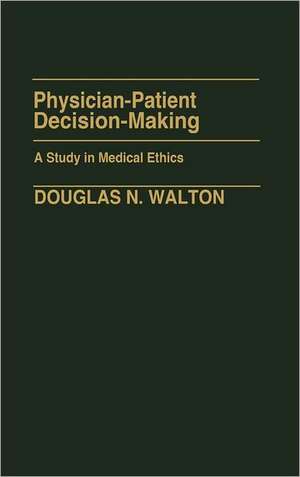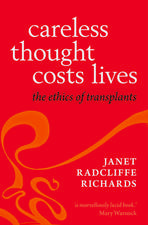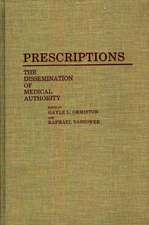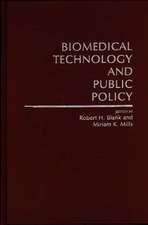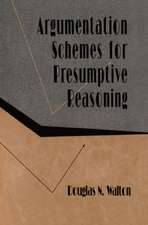Physician-Patient Decision-Making: A Study in Medical Ethics: Contributions in Afro-American & African Studies, cartea 27
Autor Douglas N. Waltonen Limba Engleză Hardback – 23 oct 1985
Walton offers a comprehensive, flexible model for physician-patient decision making, the first such tool designed to be applied at the level of each particular case. Based on Aristotelian practical reasoning, it develops a method of reasonable dialogue, a question- and-answer process of interaction leading to informed consent on the part of the patient, and to a decision--mutually arrived at--reflecting both high medical standards and the patient's felt needs. After setting forth his model, he applies it to three vital ethical issues: acts of omission, the cessation of treatment, and possible side effects of treatments. In the final chapter, Walton shows how his method functions in light of the real-life complexities of the clinical encounter and how it bears on ethical questions concerning health-care policy, attitudes toward treatment and toward the medical profession, reasonableness of expectations, and the setting of realistic goals of treatment.
Din seria Contributions in Afro-American & African Studies
- 42%
 Preț: 414.89 lei
Preț: 414.89 lei - 38%
 Preț: 444.60 lei
Preț: 444.60 lei - 41%
 Preț: 363.18 lei
Preț: 363.18 lei - 51%
 Preț: 301.92 lei
Preț: 301.92 lei - 24%
 Preț: 463.05 lei
Preț: 463.05 lei - 28%
 Preț: 462.87 lei
Preț: 462.87 lei - 48%
 Preț: 418.59 lei
Preț: 418.59 lei - 14%
 Preț: 354.30 lei
Preț: 354.30 lei - 38%
 Preț: 344.90 lei
Preț: 344.90 lei - 42%
 Preț: 304.66 lei
Preț: 304.66 lei - 31%
 Preț: 284.53 lei
Preț: 284.53 lei - 38%
 Preț: 439.09 lei
Preț: 439.09 lei - 51%
 Preț: 253.32 lei
Preț: 253.32 lei - 52%
 Preț: 250.96 lei
Preț: 250.96 lei - 42%
 Preț: 414.97 lei
Preț: 414.97 lei - 47%
 Preț: 374.33 lei
Preț: 374.33 lei - 38%
 Preț: 444.08 lei
Preț: 444.08 lei - 38%
 Preț: 440.03 lei
Preț: 440.03 lei - 38%
 Preț: 438.33 lei
Preț: 438.33 lei - 38%
 Preț: 434.61 lei
Preț: 434.61 lei - 52%
 Preț: 297.27 lei
Preț: 297.27 lei - 27%
 Preț: 441.56 lei
Preț: 441.56 lei - 24%
 Preț: 363.98 lei
Preț: 363.98 lei - 38%
 Preț: 344.22 lei
Preț: 344.22 lei - 50%
 Preț: 310.25 lei
Preț: 310.25 lei - 38%
 Preț: 344.05 lei
Preț: 344.05 lei - 34%
 Preț: 364.82 lei
Preț: 364.82 lei - 38%
 Preț: 438.41 lei
Preț: 438.41 lei - 35%
 Preț: 364.22 lei
Preț: 364.22 lei - 38%
 Preț: 500.60 lei
Preț: 500.60 lei - 18%
 Preț: 322.11 lei
Preț: 322.11 lei - 27%
 Preț: 439.51 lei
Preț: 439.51 lei - 38%
 Preț: 437.75 lei
Preț: 437.75 lei - 27%
 Preț: 465.50 lei
Preț: 465.50 lei - 24%
 Preț: 463.64 lei
Preț: 463.64 lei - 52%
 Preț: 251.53 lei
Preț: 251.53 lei - 15%
 Preț: 351.26 lei
Preț: 351.26 lei - 38%
 Preț: 344.38 lei
Preț: 344.38 lei - 27%
 Preț: 512.87 lei
Preț: 512.87 lei - 38%
 Preț: 344.63 lei
Preț: 344.63 lei - 38%
 Preț: 437.15 lei
Preț: 437.15 lei - 44%
 Preț: 167.96 lei
Preț: 167.96 lei - 28%
 Preț: 344.31 lei
Preț: 344.31 lei - 45%
 Preț: 328.88 lei
Preț: 328.88 lei - 51%
 Preț: 304.57 lei
Preț: 304.57 lei
Preț: 468.43 lei
Preț vechi: 604.81 lei
-23% Nou
89.64€ • 97.34$ • 75.30£
Carte tipărită la comandă
Livrare economică 23 aprilie-07 mai
Specificații
ISBN-10: 0313248885
Pagini: 265
Dimensiuni: 156 x 234 x 18 mm
Greutate: 0.58 kg
Editura: Greenwood Press
Colecția Praeger
Seria Contributions in Afro-American & African Studies
Descriere
Notă biografică
lton /f Douglas /i N.
